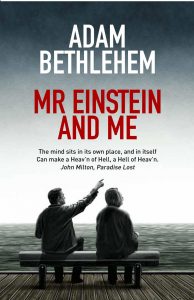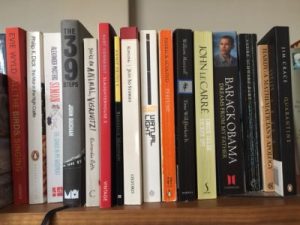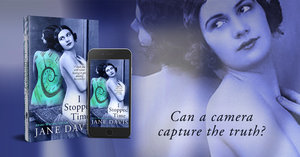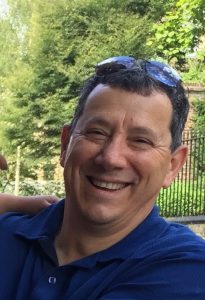Virtual Book Club is back after its summer break and today I’m delighted to welcome Adam Bethlehem.
Adam was born in London but grew up in South Africa. He trained as a doctor and taught physiology before returning to England to study physics.
Triple Point Press was founded in 2014 – Mr Einstein and Me was first published in September followed by The Universal Theory of Immigration in June 2016.
Adam no longer works as a doctor and lives in London with his wife and son.
Adam, we’re here to talk about your new release. What is it about The Universal Theory of Immigration that you feel makes it particularly suitable for book clubs?
It’s a parable set in heaven and the west-end of London and there is more to God’s journey than a simple expedition. Uncomfortable revelations can be useful as well as entertaining and God’s journey through cultural oddities leads to discoveries about fulfilment, purpose and meaning. This traveller is not just an immigrant, he is a deity making the ultimate choice between ordinary life and a settled existence in the ethereal ever-after. His struggles introduce the reader to varied themes for discussion about modern life.
The story of migration predates the media furore of recent years. Resettlements and invasions began long before biblical times and arrivals are often regarded with suspicion by the populations they seek to join. Newcomers, refugees or economic nomads, all wrestle with the routines of daily life. Many compound their difficulties by hoarding options to protect themselves from uncertainty but anyone who decides to make a permanent transition must adapt if they are to fit in.
God’s theory will not provide insurance but his story demonstrates the universality of human experience. Paradoxically, a privileged background can be a barrier to progress – only the management of expectations can alleviate problems created by memories of an entitled past.
The obstacles encountered when someone arrives at a new school, starts a new job or retires from a long-held career are not so different to those associated with relocation to a new country. The absence of familiar friends, loss of status and the need to define fresh goals in an unfamiliar environment can be just as unsettling.
And, in case you think the Universal Theory applies only to big events, try doing something – anything – new. You will find the way blocked by barriers created by prejudice and supposition. Buy a lottery ticket and expect to win? The path to failure is swift and simple. Write a novel and assume an agent to call with an offer from Hollywood? I guess we can all imagine the chances of such great good fortune.
Q: It’s at this point that I normally ask authors to describe their main protagonist in five words. Knowing that yours is God, I feel a little weird about this, but for the sake of consistency I feel I must.
Interestingly this is a problem God confronts at the start of his holiday. ‘God’ should be a complete description but he is supposed to be travelling incognito. Godwin Godfrey, as he chooses to be known, begins his sojourn in London believing himself to be omnipotent, omniscient and forgiving whereas the angels left behind in heaven might choose words like irascible, overbearing and capricious.
All is not lost. When the dust has settled, after a year or so without privileges, they might all agree that Godfrey is reasonable, philosophical and perhaps even contented.

Click here to look inside or buy The Universal Theory of Immigration
Chapter One
God’s plane landed on time at Heathrow Airport. He had thought about Gatwick or Stansted but the idea of the high-speed rail link pleased him. He could have chosen a scheduled flight but he was attentive to his status and determined to travel in style. In any case, precautions had been taken to ensure that his arrival would not be noticed.
The immigration formalities presented no difficulties and, having nothing to declare, he chose the green channel. Everything was going smoothly.
Q: Immigration is constantly in the headlines, so was your novel inspired by real life events?
This story started when I had been in London for a few years. I wasn’t working in my usual hospital job and, with relatively empty days, I couldn’t help thinking about the problems experienced by immigrants and how they adjust to a new society. It seemed to me that although individual circumstances differ, some aspects of arrival are always the same. Newcomers, rich or poor, educated or not, all have to change to fit it. In fact, immigration is a universal experience. And there it was, I had a title even before I started writing: The Universal Theory of Immigration.
Q: Where is your novel set?
With no ward round to get to, I’d set off early every day and walk. My route led me through Regents Park and I’d keep going until I found a cafe where I could sit for a couple of hours without getting in anyone’s way. Often I’d start the day without a thought in my head but by the time I reached the peak of Primrose Hill I’d find myself making plans. I wanted to be dealing with themes not bounded by time and place and I came to realise I could set my story anywhere. Which is why the plot of the Universal Theory hovers around the west-end of London, almost the route of my daily perambulations.
Q: You tackle some meaty ethical issues. How effective do you think fiction is as a bridge between the experts and the public when it comes to stimulating debate? Could it be better employed?
I started professional life as a doctor, I’ve studied physics and have done a variety of jobs over the years. The more I see of the world, the less certain I am when I hear experts offering guidance. In matters of morality, there are no experts – they are the same us, just normal people muddling through.
Science is a great method for figuring out the physical nature of reality but that doesn’t mean scientists are the best people to decide what should be done with the technology they create. To build a real bridge you probably need an engineer but … Okay, picture a valley, lush and green, with a river meandering down toward the sea. We have a physicist to describe the structure of atoms in the water and a chemist to deal with molecular interactions. Then there are biologists looking at organisms and an infrastructure expert has commissioned that engineer to build the bridge. Oh dear, the consulting geologist has discovered oil and those expert business people are selling us the prospect of being rich. But who should we ask to make decisions about the value of this valley? Might as well ask an author.
I think novels can be more accurate in reflecting the complications of reality than a simple recount of facts, and fiction has a great role in reminding us about the fallibility of totemic authority.

Q: John Irving says that you can’t teach writing. You can only recognise what’s good and say ‘keep doing that.’ Do you think that’s true?
When I get an idea, I try to get my thoughts down on paper as quickly as I can. Then, when I get to the end of a manuscript, I go back to the beginning and trim the fat until I’m happy with what’s left. That’s how I do my writing.
What would happen if I took a class? I’d find characters and create stories I don’t care about all for the sake of style – who wants to read stuff like that? Maybe it works differently for other people and maybe creative writing courses have their place but, if it was up to me, I’d suggest writers get out into the world and experience life. Have a go at writing when you feel ready and don’t worry about being good. Afterwards, long afterwards, get an editor to set you straight.
I agree with John Irving and often think about George Orwell: “When I sit down to write a book, I do not say to myself, ‘I am going to produce a work of art.’ I write it because there is some lie that I want to expose, some fact to which I want to draw attention, and my initial concern is to get a hearing.”
Q: Do you write your first draft on paper or do you prefer a computer?
I started off using pen and paper but transcribing my daily wordage to edit on a computer was tedious. I now write directly on a laptop – I don’t think about the typing at all but I save obsessively because I’d hate to lose even a day’s work.
Q: What do you think the greatest advantage of indie publishing is?
I think this is a mother-in-law thing: I’ve heard any number of mums asserting that nobody is ever going to love their little boy as much as they do. How can they possibly trust a newcomer to look after their baby, even if he’s now grown up, big and ugly? (Fathers are different. They know how great it is to have a partner and they hope for their sons and daughters the good fortune they’ve experienced for themselves.)
Books are just the same. You, as the author, spend so much time in the world of your novel. You know more than anybody the twists and turns that have led to the final manuscript and then you find yourself handing it over to someone who can’t possibly care as much. Who is going to think about the look, the feel, the particulars of the final product?
Indie Publishing offers a solution. At Triple Point, we use specialists just like any mainstream press – editors, proof readers, designers, marketing and distribution people too – but we get to be involved in everything to do with the books that go out under our name. I enjoy working on my stories but realistically I can only write for two or three hours each day. After that I’m all out of creativity and I like working with the team.
Q: What do you wish you’d known before you published your first novel?
I was still working in a hospital when I started writing novels and had no experience of the world books. The one thing I wish I had known in all the years of procrastination leading up to the release of Mr Einstein and Me (Sept ’14) was that publishing can be fun.

Q: Who designs your wonderful book covers? And which other professional services won’t you skimp on?
It was many years before I managed to produce anything longer than a short story. I’m being kind to myself, mostly my fiction was no longer than an essay. I’d get an idea and immediately get bogged down in specifics and waylaid by practicalities. One fine day I decided to put aside inhibitions, to shelve worries about plot, characters, spelling and everything else. There was no deadline and I wasn’t at school with Mrs Bulstrode waiting for my work with that red pen in her manicured hand. Me and old Mrs Bulstrode, we never did get on. Probably why I ended up in the sciences when subject choices had to be made.
Without the dragon looking over my shoulder, I started to enjoy writing a little more and it wasn’t long before I had a novel. Of course, I just loved my story so I kept going until there were two, three manuscripts on the kitchen table. We were having a lazy Sunday morning when my family discovered a need to goad me into action – what was I going to do with all these books?
Nothing good happens quickly in my world. I spoke to lots of people; some were friendly but the best advice comes from sceptics and I learned that nobody produces a book alone. Established multi-national or indie start-up, publishing is a cooperative enterprise.
I found an editor and handed over the first manuscript then, while she was using her reservoir of patience, I trawled my local bookshop looking at the covers and fonts I had taken for granted in the past. The gods were looking after me or maybe it was just luck. A new anniversary edition of The 39 Steps had just been released with, honestly, the most perfect design and cover. In an attack of bravery, I made the call and set up a blind date with Ron Callow and Simon Buchanan from Design 23. These guys have worked on so many books and everything daunting to me as a newcomer was easy in their hands.
Definitely progress. I had an editor, proof reader, designers for book and web, and it wasn’t not long before my books were being printed by the indie arm of Clays/St Ives. It was a great moment when I took the first copies to the bookshop and heard confirmation of what I already knew – books from Triple Point Press are as professional as anything from an established company.
All of this is a roundabout way of saying that there isn’t a single aspect publishing, indie or otherwise, which doesn’t need attention. A writer may start out alone and take enjoyment from a creative moment but the decision to publish means there’s a contract with the reader. The story might be great but everyone needs an editor; you may fancy yourself as an artist but you still need a designer who knows the peculiar world of books. It’s also important to remember that your friends are going to be nice – get professional help and don’t skimp. It will be worth every penny you have to spend.

Adam’s ‘shelfie’
Q: Hear, hear! And what about your own taste in reading matter? Which books are on your bed-side table? Are there any books that you find yourself returning to time and time again?
When I’m working on a novel, I find my myself rereading old favourites that I can dip into and put down. If I read something new and get too engaged, I find myself imitating styles and word patterns. It’s never a bad day to read the Sherlock Holmes stories, Smiley’s People, The Shipping News or Brokeback Mountain. You’re an Animal, Viskowitz can make any grey day feel sunny.
My latest discovery is The Genius in my Basement (Alexander Masters) and a couple of months ago I read Michael Frayn’s The Russian Interpreter. I have a collection of his novels I’m saving for summer holiday when I take a break from writing.
Q: What is your favourite bookshop?
My all-time favourite is Daunt Books in Marylebone, and not just because they’ve hosted launch parties for both my novels.

Book launch for The Universal Theory of Immigration.
Soon after arriving in London I started my first job in a nearby hospital working old-fashioned, long hours as a junior doctor. 24 hour shifts were standard, longer in emergencies, so it was treat to be able to escape to the bookshop when we were occasionally given a break. Memory is a funny thing. Even now, years later, I still get a feeling of freedom as I walk along the shelves or find a seat in the Edwardian gallery.
The booksellers are great, there’s always someone on hand with a recommendation or advice about an emergency present. I can’t be the only one rushing around before those birthday parties – it’s your daughter’s new best friend. How could you have forgotten?
Q: What are you working on at the moment?
Next week I’ll be sending another manuscript to my editor – Sally O-J, sharpen your pencils. The Legacy of Joshua Jones is a philosophical comedy of manners about a scientific gentleman struggling to deal with four confident daughters and his determinedly loyal wife.
While Sally’s looking at The Legacy, I’ll be trying to get through the first draft of a new novel: Aberration in the Pattern is a thriller without guns and axe murderers set in the financial world of London.
Want to find out more about Adam, Triple Press or the team?
Visit Adam’s Blog or his Amazon Author page. Find Adam on Facebook. Triple Point Press has its own page. Adam is also on Twitter @magichill and Instagram as adambethlehem.
You can also visit the Triple Point Press shopping page .
And for details of the team…
Design23 (Ron Callow and Simon Buchanan)
You may also like to read Adam’s case study for Clays Indie Publishing
Remember, if you enjoyed this post please share it. If there’s anything else you’d like to ask Adam please leave a comment.
To have future posts delivered directly to your in-box, visit the sidebar on the right and subscribe to my blog, or to find out about new releases, competitions and freebies, subscribe to my newsletter and grab your free copy of my novel, I Stopped Time.

And if you’re an author and would like to appear on Virtual Book Club, please fill in a contact form.



3 comments
Great post! Adam’s works sound intelligent, socially aware, and thought-provoking. What a great idea to turn God into an immigrant- to have God experience the same things that people experience who are trying to make better lives for themselves in new places with different languages, customs, foods, and histories. Kudos! The book sounds fascinating.
His website is fabulous. Have you checked it out? I’m so envious.
Hi Jane, it has been a great pleasure working with you – thanks for including me in the Virtual Book Club.
Best wishes
Adam